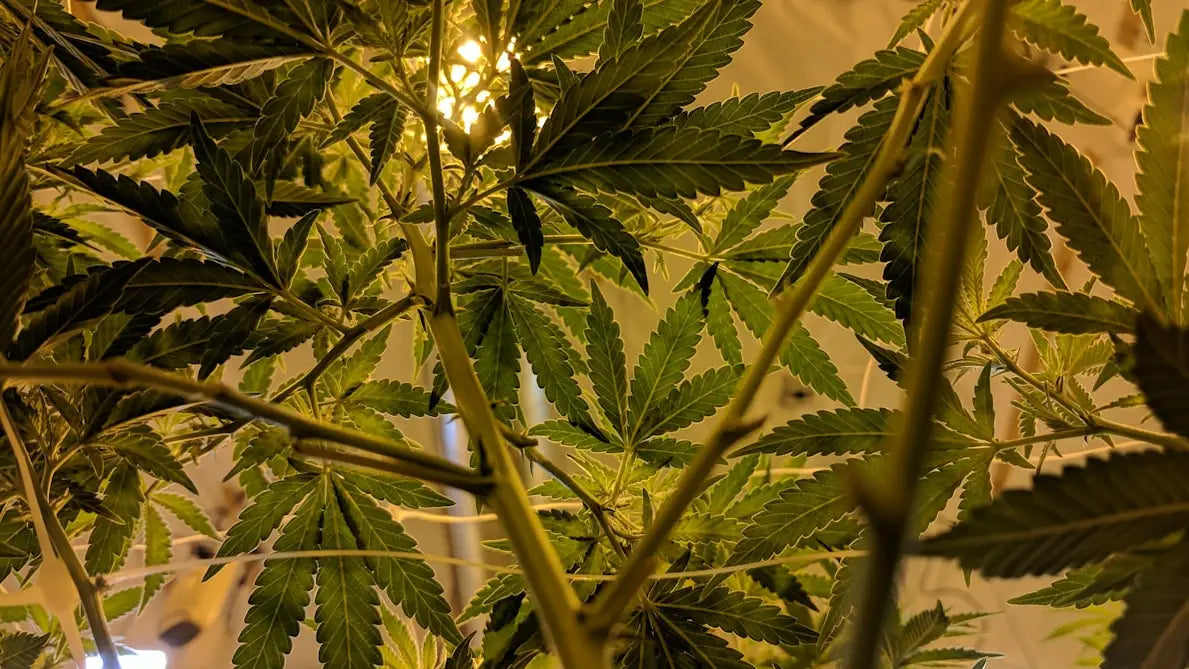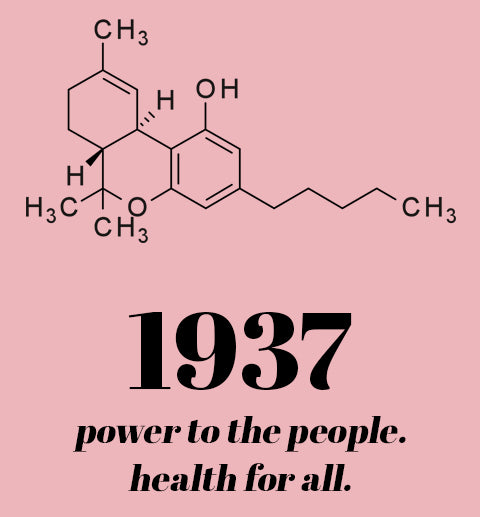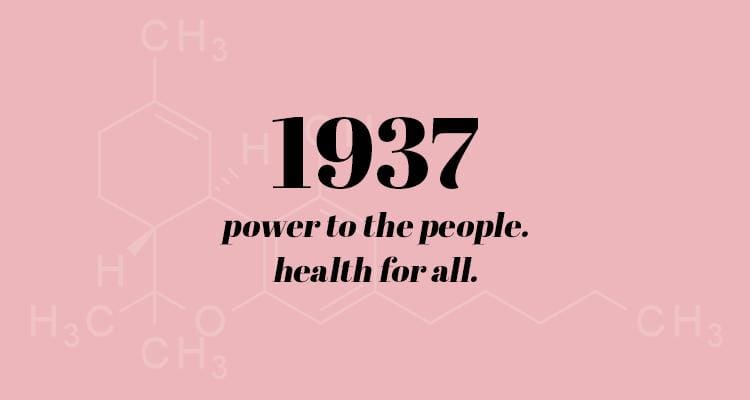THC vs. CBD: Which One Gets You High?

If you assumed that tetrahydrocannabinol (THC) and cannabidiol (CBD) were the same, you wouldn’t be the only one. Because of CBD’s recent entry into public consciousness, people from California to New York think that the compounds are synonyms, but that’s simply not true.
Although they’re both natural cannabinoids that are part of the Cannabis plant and have similar molecular structures, they produce unique effects on your body.
THC is the main psychoactive component found in the marijuana plant. It’s the one responsible for you feel, you know, high.
CBD is also found in marijuana and hemp plants, and it does not cause any psychoactive effects.
Before we delve into the science behind why you do not get high from CBD, it’s important to understand what the similarities and differences are between the two cannabinoids on a scientific level.

Chemical Structures of THC and CBD
The chemical structures of THC and CBD are very similar in some ways and different in other ways.
Both the THC and CBD compounds have the same structure on a molecular level. This means they're composed of the same number of atoms; they both have 30 hydrogen atoms, 21 carbon atoms, and 2 oxygen atoms. But the chemical structure of each compound differs because of the way that those atoms are arranged.
CBD is formed in a way that allows it to have more flexibility and a different overall shape than THC. This is due to its break in the ring structure, and its additional hydrogen bond.
The differences in the structures cause CBD to have a different shape and a different distribution of charge, so it reacts with your body differently than THC.
We could go into much more detail describing the molecular structures of both compounds, but for the sake of not turning this into a full-on chemistry course, all you need to know is that CBD and THC are shaped differently because of the arrangement of atoms.
This quick analogy may help you to better visualize the differences: Siblings in a family are very similar to each other because they both come from the same family and share nearly identical genetics. But each sibling looks and acts differently from the others because of the way that their genes are expressed.
Think of THC and CBD as siblings that both come from the same cannabis family but still look and act differently from each other.
How THC Affects Your Body
A lot of people smoke weed to feel high, especially now that many states are legalizing the recreational use of marijuana. But do you know why you get high on THC?
It all starts with the endocannabinoid system (ECS), and how it's activated by cannabinoids like THC.
When THC enters your body, it binds to receptors in your ECS called the Cannabinoid Receptor-1 (CB-1). Its tight bind the receptor is what produces the effects that cause you to feel high.
THC and the CB-1 receptor are like two puzzle pieces that fit perfectly together. Once they are linked, they create a psychoactive response in your body, and viola, you experience a head high.
Note that THC is not the only chemical that affects your body’s endocannabinoid system. A 2015 study on cannabinoid receptors found that a naturally produced chemical called anandamide, which is commonly released after you exercise, can cause your body to feel what we usually call a “runner's high.” THC is shaped similarly to anandamide, which allows it to easily hijack the receptor.
Now, keep in mind that while THC causes you to feel the psychoactive effects that lead you to feel high, CBD is completely different.

How CBD Affects Your Body
Since CBD's shape differs from THC, it cannot link up with the CB-1 receptor in the same way. CBD still interacts with the receptor, but in an entirely different manner and with different results. Many studies, for example, have found that CBD may have an opposite effect on the brain after it reaches the receptors.
Research shows that when you introduce CBD to your ECS, it interacts with the CB-1 receptor and changes its shape, which in turn causes THC to no longer bind to the receptor. This means that if you take both THC and CBD together, it diminishes the psychoactive effects of THC in your body, causing you to either not get high or to experience a diminished high.
Also, when CBD interacts with your ECS, it promotes the creation of natural chemicals in your body, chemicals like anandamide, feel-good chemicals. This causes a reduction in feelings of pain, anxiety, restless sleep -- anything that weighed down your ECS.
Why You Get High with THC and Not CBD
Now that we’ve talked about all of the scientific reasons for why THC and CBD are different and how those differences change the way the compounds affect your body, we can summarize the main point: THC gets you high and CBD does not.
THC interacts with your body in a way that causes you to feel euphoric and can also provide relief from things like pain or anxiety. CBD interacts with your body in a way that provides you with relief from many of the same conditions without the psychoactive side effects.
As mentioned before, this is all because the compounds have different chemical structures which cause them to bind with your body’s natural endocannabinoid receptors differently, so they cause a different response in your body.
Many products include both THC and CBD. So if you want to experience a head high, you'll want to look for cannabis products that have a higher percentage of THC and a low percentage of CBD. If you shirk from head highs, switch it up -- buy cannabis products with a high percentage of CBD and a low percentage of THC.

Medical Benefits of THC vs. CBD
Both THC and CBD have various medical benefits, and many of them are the same. They provide relief from several of the same conditions, although CBD doesn't cause the same psychoactive effects that THC does. This makes CBD an essential component of medical marijuana.
THC is often used to help with conditions such as:
- Anxiety
- Glaucoma
- Insomnia
- Low appetite
- Nausea
- Pain
CBD is often used to help with conditions such as:
- Anxiety
- Depression
- Inflammation
- Insomnia
- Migraines
- Nausea
- Pain
- Psychosis or other mental disorders
- Seizures
For some people, the psychoactive side effects caused by THC can cause anxiety, so CBD may be a better option because it does not have those effects. And because of its calming effects, CBD can help people suffering from psychosis or other mental disorders.
Also, the FDA recently approved the first cannabis-derived medication designed to help treat epilepsy syndromes. This medication is called Epidiolex and it contains CBD.
Side Effects of THC vs. CBD
THC is known for the many side effects it produces. A few of these temporary effects include:
- Bloodshot eyes
- Lack of coordination
- Increased heart rate
- Memory loss
- Dry mouth
- Reduced reaction times
Pure CBD, on the other hand, is not associated with any side effects. Research shows that any side effects that occur with the use of CBD are likely only due to reactions with other medications you may be taking. Adding to this theory, the World Health Organization released a report stating, “to date, there is no evidence of public health-related problems associated with the use of pure CBD.”
CBD vs. THC in Drug Tests
Not every drug test detects CBD in your body, although some tests are CBD-sensitive so they can pick up on that compound. Most drug tests are designed to look for THC.
Keep in mind that many CBD products may contain some THC, so a test could show that you are positive for THC even if you have only used CBD products.
Both of the cannabinoids are stored in your body’s fat, which means that they can be detectable through drug tests for up to several weeks after you use them in some cases.

Jessica has been a freelance writer for four years, with a passion for science and health-related topics. She is also a lover of doing research and genuinely enjoys reading clinical studies, especially if it has anything to do with the emerging research on the health benefits of CBD. Jessica has a degree in behavioral science. She is a travel addict and an avid League of Legends player. She is also a proud dog mom to a Husky and an Australian Shepherd, so she’s frequently covered in dog fur and utterly exhausted from their constant shenanigans.

